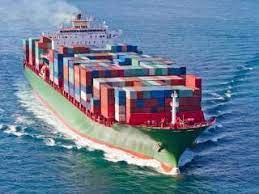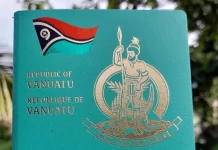A group of former Pacific leaders want the UN agency mandated to regulate international shipping “to take meaningful strides” to end the industry’s reliance on dirty fossil fuels.
The International Maritime Organisation (IMO) is meeting for a two-part climate summit in London over the next two weeks with the aim to arrive at a key agreement on cutting pollution from shipping.
The Pacific Elders Voice (PEV) group said the issues on the negotiating table at the 15th Intersessional Working Group on Reduction of Greenhouse Gas Emissions from Ships (ISWG-GHG-15) from 26-30 June and the 80th Marine Environment Protection Committee (MEPC80) meeting from 3-5 July “will have long-term consequences for our economic and societal futures”.
The leaders – which include former president of the Marshall Islands Hilda Heine, former president of Palau Tommy Remengasau, former president of Kiribati Anote Tong, and the former prime minister of Tuvalu Enele Sopoaga as well as former secretary-general of the Pacific Islands Forum Dame Meg Taylor – said shipping is a lifeline for the Pacific, providing “access to crucial energy and supplies needed to power our economies”.
“However, shipping is also a significant source of historical and contemporary emissions that have also contributed to climate harms in the past and will continue to harm the climate system,” the group said.
“The climate harms caused by shipping are the negative externalities that have yet to be mitigated and compensated by the industry.”
The group sees the MEPC80 as the “last opportunity” for the sector – responsible for 90 percent of global trade – to fully decarbonise by 2050.
“We would also like to highlight the significance of this meeting for shipping, regional and international trade and climate action generally. The matters under negotiation at MEPC80 will have long-term consequences for our economic and societal futures,” they said.
“As many commentators and experts have noted, MEPC80 is the industry’s last opportunity to secure a 1.5 degrees-aligned pathway.”
In 2018, the IMO adopted an Initial Strategy for reducing emissions from the sector and it is expected to adopt a Revised Strategy at the MEPC80 next week, although much of the “heavy lifting” according to industry sources, is expected to be done this week at the ISWG-GHG-15.
“Failure to agree on a Revised Strategy will result in a patchwork of regional measures, further isolating developing countries as decarbonisation becomes more expensive, and leave them grappling with the impacts on their small and fragile economies with no assistance or intervention,” the Pacific Elders said.
The former leaders also commended the alliance of Pacific nations, often referred to as 6PAC, who have been actively campaigning at the IMO for 1.5 degrees and for an equitable transition from fossil fuels to be embedded in the IMO’s Revised Strategy.
Last week, the Marshall Islands President David Kabua called for the IMO’s goals to align with the Paris Agreement target for a bold and equitable transition.
Kabua also called for the IMO to “enact a greenhouse gas levy”, saying that by doing so it would “chart a course forward for the whole world on climate action”.
The Pacific Elders Voice said: “An equitable transition ensures that no states are left behind and ensures an equitable distribution of revenues collected by any fund set up by GHG levy on shipping.”
They are calling on IMO member states to ensure the new strategy includes an overall target of zero emissions no later than 2050, with hard interim targets for 2030 and 2040.
“The Revised Strategy should also have a clear basket of measures, which should include a universal, mandatory GHG levy on emissions starting at US$100 per ton of emissions, as proposed by the Marshall Islands and Solomon Islands.”
But while the IMO’s current goal is halving emissions by 2050, new research published on Monday is showing that global shipping can halve its greenhouse gas emissions by the end of the decade, without impacting global trade.
The study by CE Delft cancels out concerns over rising costs of global trade in case the IMO increases its climate targets for global shipping, used by countries opposing a higher ambition, like Argentina, China, India, Brazil, Ecuador, Saudi Arabia.
Advocacy group, Clean Shipping Coalition, are calling for the IMO member states urgently support halving shipping emissions, saying the study “provides strong evidence to policymakers that these targets are also economically and technologically feasible,” the coalition said via a statement.
“The analysis shows that ships can achieve 36-47 percent emissions reduction by 2030 compared to 2008 levels by deploying 5-10 percent zero or near-zero emission fuels, wind-assist technologies, and by ‘climate optimising’ the speed of ships,” it said.
“The study also concludes that costs associated with these emissions cuts would be manageable. Halving emissions in this decade would only add around 10 percent to the total cost of shipping operations, a sum that would be dwarfed by the cost of climate related damages to the industry and wider society if shipping fails to cut emissions.”
University College London estimates every year of inaction this decade will add an extra US$100 billion to the cost of shipping decarbonisation, it added.
“The costs are minimal for the industry to step up and meet their responsibilities for decarbonisation, steering shipping into alignment with a 1.5 degrees’ world, while helping to avoid the worst impacts of climate change,” Transport & Environment campaign group director shipping Faig Abbasov said.
“The upcoming IMO Marine Environment Protection Committee meeting in July is a historic opportunity to decarbonise international shipping, and including science-based 2030 and 2040 targets are essential to meeting this moment, said Abbasov.
SOURCE: RNZ PACIFIC/PACNEWS















